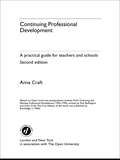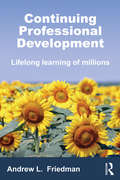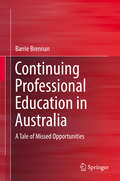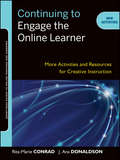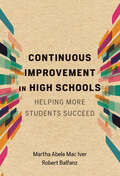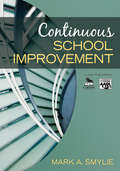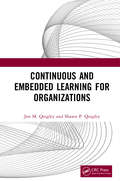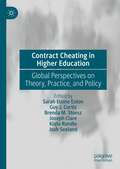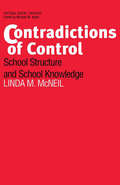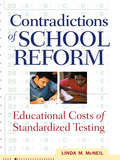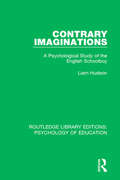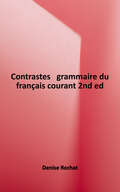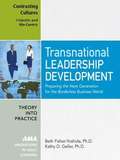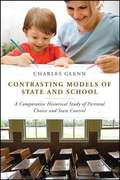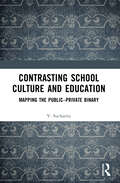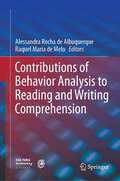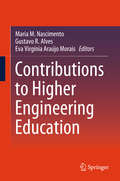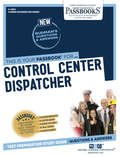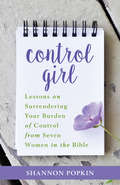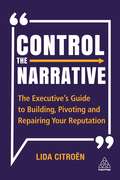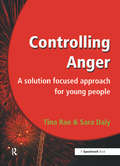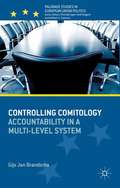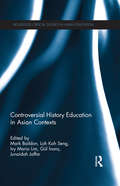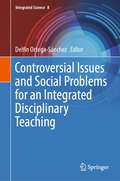- Table View
- List View
Continuing Professional Development: A Practical Guide for Teachers and Schools (Educational Management Ser.)
by Anna CraftFirst Published in 2004. Routledge is an imprint of Taylor & Francis, an informa company.
Continuing Professional Development: Lifelong Learning of Millions
by Andrew L. FriedmanContinuing Professional Development (CPD) is the means by which the professions across the world ensure that their knowledge and skills remain up to date and relevant to changing needs and environments. CPD significantly contributes to the quality and reputation of the professions and therefore to the quality of national and international social life and economic well being. Starting with a discussion on what CPD is, the author analyzes how professional bodies govern CPD, what support they provide to individual professionals and how they measure or evaluate what individuals do under the provenance of CPD. Continuing Professional Development explains why, up to now, CPD has been a relatively neglected subject in spite of it being carried out by millions. It argues whether a variety of perspectives or visions of CPD has held back wider public appreciation of it and if greater co-ordination by professional bodies, or the introduction of new players to the field, will change this in the future. Providing the first comprehensive study of the subject, this innovative book will be required reading for CPD professionals and researchers and is a fascinating read for all professionals, especially those involved with human resource development and management / leadership development.
Continuing Professional Education in Australia: A Tale of Missed Opportunities
by Barrie BrennanThis book offers a history of Continuing Professional Development (CPD) in the Australian context. It presents an approach that links the development of CPD to a series of 'missed opportunities' and the identification of three key themes (mandatory CPD, competencies and regulation/registration) as well as with national regulation for select health professions. It not only relates the evolution of CPD in Australia but also serves as a guide to examining the situation in other countries and the emergence of CPD in individual professions. CPD has been provided for many decades, but it has not been rated as a 'high priority' or a key area of provision and has not been the focus of discussions or disputes in the higher education sector or in vocational education circles. Nevertheless in describing CPD's development, evidence is presented that CPD has made a significant contribution to the broad field of vocational education.
Continuing to Engage the Online Learner
by Rita-Marie Conrad J. Ana DonaldsonThis book includes a definitive model for engaged learning that can be applied in a wide range of on-line learning environments and across age levels. It also addresses current topics such as engaging in a blended learning environment, social networking, and using related technology tools. Continuing to Engage the Online Learner provides an introduction to the theory of engaged learning and its design, assessment, and management in online and blended learning environments. In addition, the book describes the types of activities that engage the online learner in each phase of engagement and provides 50 new examples of activities.
Continuous Improvement in High Schools: Helping More Students Succeed
by Robert Balfanz Martha Abele Mac IverContinuous Improvement in High Schools gives educators and policymakers an accessible, actionable framework to address one of the nation's most important educational priorities: improving high school graduation and postsecondary preparedness rates.Martha Abele Mac Iver and Robert Balfanz, national experts in dropout prevention, apply the Carnegie Foundation&’s continuous improvement framework to the issue of student success in high school, starting with the critical ninth-grade year. A proven tool for organizational change, the framework provides a systematic structure for examining the root causes of problems and testing possible solutions.Mac Iver and Balfanz draw on their decades of experience working with educators and their deep knowledge of challenges faced by high schools to customize the framework to the high school context. They model the use of improvement science principles such as establishing practical measures, conducting disciplined inquiry, and accelerating learning through networked communities. With real-world examples and ideas for change, the authors show how attention to five key areas can enrich student educational experience and improve high school outcomes. These areas are early warning and intervention systems; family engagement; students&’ sense of connectedness to school; social, emotional, and academic development; and teacher instructional practices.The guidance offered in this useful work will enable educators and their collaborating partners to create their own powerful solutions for student success.
Continuous School Improvement
by Dr Mark A. SmylieThis volume from the Leadership for Learning series outlines best practices for sustaining improvement and demonstrates how to set goals, develop trust, and build a culture of responsibility.
Continuous and Embedded Learning for Organizations
by Jon M. Quigley Shawn P. QuigleyThere is considerable connection between growth of the personnel in the organization and the ability for the company to compete over time. Looking outside for help training may be required but looking within for opportunities for enhanced training and growth, will foster a continually improving and growing organization. This book examines the opportunities for learning, within the organization and its’ activities, along with the connection to motivation. Additionally, it provides information on the characteristics of organizations that are able to quickly disseminate, along with approaches for improving this distribution of that learning throughout the organization.
Contract Cheating in Higher Education: Global Perspectives on Theory, Practice, and Policy
by Sarah Elaine Eaton Guy J. Curtis Brenda M. Stoesz Joseph Clare Kiata Rundle Josh SeelandThis edited volume—the first book devoted to the topic of contract cheating—brings together the perspectives of leading scholars presenting novel research. Contract cheating describes the outsourcing of students’ assessments to third parties such that the assignments or exams students submit are not their own work. While research in this area has grown over the past five years, the phenomenon has been exacerbated by the COVID-19 pandemic. Themes addressed in this book include the definition of contract cheating, its prevalence in higher education, and what motivates students to engage in it. Chapter authors also consider various interventions that can be used to address contract cheating’s threat to academic integrity in higher education including: assessment practice, education, detection strategies, policy design, and legal interventions.
Contracts: A Context and Practice Casebook, 3rd ed
by Michael Hunter Schwartz Adrian J. WaltersEvery chapter in this innovative casebook places students in roles as practitioners handling simulated law practice problems; provides context in the form of an overview of the law, similar to that which an attorney would read before reading cases in a new subject area; includes questions designed to encourage students to find the applicable statutes and cases on point in the state where the student is planning to practice law; includes exercises, visual aids, and case reading scaffolds, designed to engage students with a wide range of learning styles; and ends with professionalism questions addressing ethical and professional identity questions suggested by the materials in the chapter. The third edition of Contracts: A Context and Practice Casebook reflects an effort to move the book and accompanying teaching materials into the next generation. Like prior editions of the book, the third edition adopts a learner-centered approach and draws deeply from modern brain science. The book contains dozens of problems, many of which the authors created in collaboration with practicing attorneys, and, the very extensive teacher's manual, includes learning objectives for each doctrinal area, dozens of multiple-choice questions, and detailed teaching notes. This new edition includes the integration of the multiple-choice questions, which have been substantially revised with Carolina Academic Press's Core Knowledge software, and the use of color throughout the book, which adds visual interest, promotes clarity and provides emphasis.
Contradictions of Control: School Structure and School Knowledge (Critical Social Thought)
by Linda M. McNeilMcNeil traces the poor quality of high school instruction t the tensions between the social control purposes of schooling and the schools' educational goals.
Contradictions of School Reform: Educational Costs of Standardized Testing (Critical Social Thought)
by Linda McNeilFirst published in 2000. Routledge is an imprint of Taylor & Francis, an informa company.
Contrary Imaginations: A Psychological Study of the English Schoolboy (Routledge Library Editions: Psychology of Education)
by Liam Hudson<
Contrastes: Grammaire du français courant
by Denise RochatThe 2nd edition of Contrastes: grammaire du français courant remains what it originally set out to be: a comprehensive French grammar review geared specifically to English-speakers with some exposure to the French language. Written in French (with occasional footnotes and explanations in English), it is meant for those who have already acquired a foundation in French, but who need a tool to help them review and expand upon what they already know to improve their mastery of complex grammar rules and formations. <p><p> Features: <p> <p>• Written in French, with idiomatic North-American translations of all examples. <p>• Nota Bene helps students focus on correcting the most common mistakes by drawing attention to exceptions, contrasts, or frequent errors. <p>• Charts and Tableaux synthétiques allow visual learners to grasp information at a glance. <p>• Generous lists of frequently used verbs, helpful vocabulary, and familiar idiomatic expressions within the chapters make for easier learning and retention. <p>• Systematic comparative approach provides a wealth of examples that establish points of comparison and contrast between confusing structures in French and English and focus on correcting the most common mistakes. <p>• Thorough yet versatile and adaptable text that is useful in intermediate, advanced, culture, grammar, translation, or graduate courses, or on its own as a grammar reference. <p>• Short verification exercises are designed to help students master key concepts and rules and build confidence as they move from simple to complex structures. <p>• Accompanying Workbook, cross-referenced with the textbook, closely follows the presentation of each chapter and provides ample opportunity for additional practice.
Contrasting Cultures: I-Centric and We-Centric
by Beth Fisher-Yoshida Kathy D. GellerThis chapter from Transnational Leadership Development introduces leaders to the contrasts that exist between those raised in cultures that focus primarily on the needs and interests of the individual—I-centric cultures—and those raised in cultures that place primary emphasis on the collective needs of the group (family, work team, organization, society, etc.)—we-centric cultures. It covers behaviors, expectations, how to manage their performance, and how to get them working together.
Contrasting Models of State and School: A Comparative Historical Study of Parental Choice and State Control
by Charles L. Glenn'School Choice' is one of the most hotly debated topics in educational policy. International comparison makes it possible to gain perspective on the issue, and this book profiles - historically and in current policies - two countries which give most support to parental choice.
Contrasting School Culture and Education: Mapping the Public–Private Binary
by V. SucharitaThis book presents a comparative ethnographic understanding of government and low-fee private schools in India within the context of ever-increasing privatization and commercialization of education and the growing presence of non-state actors. Drawing on rich empirical data, the book provides an ethnographic account of a government and a low-fee private school in Hyderabad, India, and explores life in these two distinct spaces through the lens of culture. While private schools catering to the poorer sections have been proliferating, little is known about how these low-fee private schools operate, how choices and negotiations unfold, the classroom discourses, subjective meanings of different stakeholders, and the kind of education provided in these schools vis-à-vis the government schools. The book focuses on the educational experiences, schooling choices, processes, and voices of the children and teachers at these schools to reflect on how school culture influences the quality of education. Based on intensive fieldwork and qualitative data, the book provides contextual insights into what exactly happens inside the schools and classrooms of two contrasting schooling provisions in India and helps understand the world views of different stakeholders as they negotiate their daily lives. The book will be of interest to students, researchers, and teachers of education, sociology of education, childhood studies, urban education, and teacher education. It will also be useful for education policymakers, educationists, education professionals, and those working on private schooling in India.
Contributions of Behavior Analysis to Reading and Writing Comprehension
by Alessandra Rocha de Albuquerque Raquel Maria de MeloThis book shows how behavior analysis can be applied to teaching reading and writing to primary school students and to special populations, such as children with intellectual and hearing disabilities and illiterate adults. Originally published in Portuguese, this contributed volume is now translated into English and presents for the first time to international researchers and students a comprehensive overview of a research program developed for more than three decades in Brazil which gave birth to a unique teaching program based on the concept of stimulus equivalence: the Learning to Read and Write in Small Steps. The book is divided into four parts. The first part presents the theoretical framework and the historical context in which the teaching program was developed by the group led by Drs. Julio Cesar de Rose and Deisy das Graças de Souza, currently organized in the National Institute of Science and Technology on Behavior, Cognition, and Learning (INCT/ECCE). The second part describes the modules that make up the Learning to Read and Write in Small Steps teaching program. The third part presents results of empirical research conducted with children with intellectual and hearing disabilities and illiterate adults. Finally, the fourth part presents contributions from other areas of knowledge – such as speech therapy, linguistics, and education – to the understanding of reading and writing and possible dialogues between them and behavior analysis. Contributions of Behavior Analysis to Reading and Writing Comprehension will be of interest to researchers and students in the fields of psychology and education interested in the application of behavior analysis to teaching and learning processes. It will also be a valuable resource for professionals directly working in educational institutions, such as elementary school teachers and psycho-pedagogues. The translation of the original manuscript in Portuguese was done with the help of artificial intelligence. The present version has been revised technically and linguistically by the authors in collaboration with a professional translator.
Contributions to Higher Engineering Education
by Maria M. Nascimento Gustavo R. Alves Eva Virgínia Araújo MoraisThe book focuses on teaching knowledge and principles (Higher Education) regarding professional practice of engineering (life and lifelong learning). It covers recent developments in engineering education. This book comprises the select proceedings of the conference organised by the Portuguese Society for Engineering Education. This book goes beyond the examination of the economic, culture, and social factors, which influence the education of engineers in different higher education institutions, and encompasses critical thinking and problem solving, communication, collaboration and creativity and innovation. These are essential components of engineering education. The contents of this book are useful to researchers and professionals engaged in the re-engineering of engineering education.
Control Center Dispatcher: Passbooks Study Guide (Career Examination Series)
by National Learning CorporationThe Control Center Dispatcher Passbook® prepares you for your test by allowing you to take practice exams in the subjects you need to study. It provides hundreds of questions and answers in the areas that will likely be covered on your upcoming exam.
Control Girl: Putting God in Charge of My Happy Ending
by Shannon PopkinLittle fights with your husband and kids. Unhappiness when things don't match your version of perfect. Tension, anger, fear--it all begins with a heart that craves control. When your vision of how life should be replaces God's vision, you doom your quest for security, peace, and joy before it even starts. Thankfully, there is a better way.Join Shannon as she shares what she has discovered about her own control struggles and about God from studying Control Girls in the Bible. Learn how you too can lay down this burden and find rest in surrendering to the One who truly is in control."In this funny, tender, and truth-telling book, Shannon Popkin peels back the layers of our control problem."--Erin Davis, author, blogger, and recovering Control Girl"In the style of Liz Curtis Higgs, Control Girl is an easy and entertaining read, yet Shannon Popkin packs a punch where we so need it if we are to be set free from the stressful habit that robs our joy and ruins our relationships!"--Dee Brestin, author of Idol Lies"With personal vulnerability, biblical depth, powerful personal illustrations, and pointed application questions, Shannon Popkin reveals how seven women of the Bible can teach us how to surrender our will to God's design for our future."--Carol Kent, speaker and author of Becoming a Woman of Influence"Control Girl is a penetrating look at how selfishness and self-protectiveness wreck lives--and why surrender and trust are God's life-giving pathways to true freedom and joy."--Nancy DeMoss Wolgemuth, author and Revive Our Hearts teacher and host
Control the Narrative: The Executive's Guide to Building, Pivoting and Repairing Your Reputation
by Lida CitroënEveryone has a personal brand, by design or default. Your reputation is one of the most critical determinants of your career success. Control the Narrative makes your reputation work for you by using the power of personal branding to put you in control of the opportunities you attract. For professionals seeking to grow, change or fix their careers, the book shows you how to capitalize on the reputation assets that are relevant to your goals and shed the ones that no longer serve you. If you have made a career mistake and need help repairing your reputation, you'll discover how to assess the situation, break the crisis down into a series of actionable responses and re-establish career viability.To be effective, a personal brand must be authentic. Through the process of personal branding, Control the Narrative helps you uncover the core values that form the foundation of your strategy for building, pivoting or repairing your reputation. This book also shows you how to measure the success of your brand and provides suggestions for modifying your strategy when results aren't what you expected. Filled with real life examples, Control the Narrative provides you with the strategic advice and tactical assets to consistently and confidently create a positive reputation.
Controlling Anger: A Solution Focused Approach for Young People
by Sara Daly Tina RaeMany pupils experience difficulty in controlling their strong feelings and in managing conflict in both school and home settings. This programme aims to help young people: * avoid or manage situations of conflict * understand that they can create change * realise that it is possible to resolve difficulties and achieve a positive outcome. In this thoughtful approach to anger management, the authors suggest a teaching and learning model and use 'story' as the focus of pupil engagement. The book uses eight newspaper articles to help pupils to develop emotional literacy through subjects such as: * Road rage * racist incidents * Happy slapping * street fights. During the 10 session programme young people will: * understand anger in a variety of situations * learn about physiological and behavioural aspects of anger * rehearse coping strategies * plan positive responses to provocative situations. This book offers teachers and non-teaching staff a practical, exciting and well-designed resource with full facilitator notes and all handout materials printable from the downloadable resources.
Controlling Comitology
by Gijs Jan BrandsmaComitology is the most important form of multi-level governance in the EU. Member State and Commission actors together create roughly 2,500 executive acts per year amounting to half of all European laws. Using new European and national data, this books argues that its accountability has improved over time, but that unexpected gaps have emerged.
Controversial History Education in Asian Contexts (Routledge Critical Studies in Asian Education)
by Gül İnanç Mark Baildon Loh Kah Seng Ivy Maria Lim Junaidah JaffarThis book examines both history textbook controversies AND teaching historical controversy in Asian contexts. The different perspectives provided by the book’s authors offer numerous insights, examples, and approaches for understanding historical controversy to provide a practical gold mine for scholars and practitioners. The book provides case studies of history textbook controversies ranging from treatments of the Nanjing Massacre to a comparative treatment of Japanese occupation in Vietnamese and Singaporean textbooks to the differences in history textbooks published by secular and Hindu nationalist governments in India. It also offers a range of approaches for teaching historical controversy in classrooms. These include Structured Academic Controversy, the use of Japanese manga, teaching controversy through case studies, student facilitated discussion processes, and discipline-based approaches that can be used in history classrooms. The book’s chapters will help educational researchers and curricularists consider new approaches for curriculum design, curriculum study, and classroom research.
Controversial Issues and Social Problems for an Integrated Disciplinary Teaching (Integrated Science #8)
by Delfín Ortega-SánchezThe scientific literature has been showing that the teaching of controversial topics constitutes one of the most powerful tools for the promotion of active citizenship, the development and acquisition of critical-reflective thinking skills (Misco, 2013), and education for democratic citizenship (Pollak, Segal, Lefstein, and Meshulam, 2017; Misco and Lee, 2014). It has also highlighted, however, the complexities, risks and interference of emotional reactions in learning about sensitive, controversial or controversial historical, geographical or social issues (Jerome and Elwick, 2019; Reiss, 2019; Ho and Seow, 2015; Washington and Humphries, 2011; Swalwell and Schweber, 2016).Recent studies have advanced in the analysis of strategies employed by teacher educators in teaching controversial issues (Nganga, Roberts, Kambutu, and James, 2019; Pace, 2019), and in the curricular decisions of teachers about this teaching (Hung, 2019; King, 2009). These developments confirm the appropriateness of discussing or developing deliberative skills and conversational learning as the most appropriate strategy for the didactic treatment of controversial issues (Claire and Holden, 2007; Hand, 2008; Hess, 2002; Oulton, Day, Dillon and Grace, 2004; Oulton, Dillon and Grace, 2004; Myhill, 2007; Hand and Levinson, 2012; Ezzedeen, 2008). The promotion of discussion on specific social justice issues has also been approached from the use of controversial or documentary images in teacher education contexts, in order to question what is happening or has happened in present and past societies (Hawley, Crowe, and Mooney, 2016; Marcus and Stoddard, 2009).In this context, the aim of this contributed volume is, on one hand, to understand the discourses and decision-making of teachers on controversial issues in interdisciplinary educational contexts and their association with the development of deliberation skills. On the other hand, it seeks to offer studies focused on the analysis of the levels of coherence between their attitudes, positions and teaching practices for the teaching and learning of social problems and controversial issues from an integrated disciplinary perspective.
